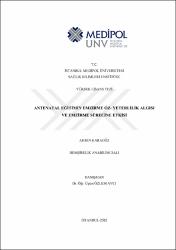| dc.contributor.advisor | Avcı, Özlem | |
| dc.contributor.author | Karagöz, Ahsen | |
| dc.date.accessioned | 2021-06-29T08:09:48Z | |
| dc.date.available | 2021-06-29T08:09:48Z | |
| dc.date.issued | 2018 | en_US |
| dc.date.submitted | 2018-11-09 | |
| dc.identifier.citation | Karagöz, A. (2018). Antenatal eğitimin emzirme öz-yeterlilik algısı ve emzirme sürecine etkisi. (Yayınlanmamış yüksek lisans tezi). İstanbul Medipol Üniversitesi Sağlık Bilimleri Enstitüsü, İstanbul. | en_US |
| dc.identifier.uri | https://hdl.handle.net/20.500.12511/7366 | |
| dc.description.abstract | Antenatal dönemde verilen emzirme eğitiminin emzirme öz yeterlilik ve emzirme sürecine etkisini belirlemek için planlanan bu araştırma Ağustos 2017- Mart 2018 tarihleri arasında, İstanbul'da özel bir hastanede Kadın Sağlığı ve Hastalıkları polikliniğinde gerçekleştirilen yarı deneysel tipte bir araştırmadır. Araştırmada çalışma grubunda 50, kontrol grubunda 50 olmak üzere toplam 100 gebe yer almaktadır. Araştırmacı tarafından çalışma grubundaki gebelere 2 hafta içinde 6-8 kişilik gruplar halinde 1 oturum olacak şekilde 70-80 dk eğitim verilmiştir. Çalışma ve kontrol grubundaki annelerin postnatal ilk 24 saat içinde 1.,4. ve 6. ayda emzirme öz-yeterlilik algıları ile bebeklerin boy, kilo ölçümleri, emzirme başarıları ölçülmüştür. Birinci ayda Postnatal Anne Bilgi Formu uygulanmıştır. Verilerin istatistiksel değerlendirilmesinde; istatistik programı kapsamında tanımlayıcı istatistikler ile ANOVA ve bağımsız gruplar için t testi kullanılmıştır.Çalışma sonuçlarına göre; gebelerin daha önce emzirme deneyimi oranının çalışma grubu için %40, kontrol grubu için %52 olduğu belirlenmiştir. Çalışma grubundaki gebelerin %70'i, kontrol grubundaki annelerin %48'i bebeklerini ilk ayda 6 ek gıda olmadan emzireceklerini ifade etmişlerdir. Çalışma grubundaki annelerin bebeklerini ilk yarım saat içinde emzirme durumu %32.0 iken, kontrol grubundaki annelerin sadece %12.0'ı ilk yarım saat içinde bebeklerini emzirmişlerdir. Bununla birlikte özellikle çalışma grubunda aylar ilerledikçe emzirme oranının yüksek oranda devam ettiği bulunmuştur. Emzirme süreci içerisinde çalışma grubu LATCH puanlarının tekrarlı ölçümleri arasında istatistiksel olarak anlamlı fark bulunmaktadır (p<0,05). Ayrıca, çalışma ve kontrol grubunun doğum öncesi öz-yeterlilik puanları arasında istatistiksel olarak anlamlı fark yok iken, eğitim sonrası çalışma grubu ve kontrol grubunun doğum sonrasındaki öz-yeterlilik puanları arasında istatistiksel olarak anlamlı fark bulunmaktadır (p<0,05). Araştırma sonuçlarına göre; emzirme özyeterlilik algısını güçlendirme temelli doğum öncesi izlemlerin düzenli yapılarak emzirme eğitimlerine gebelik döneminde başlanması önerilebilir. | en_US |
| dc.description.abstract | This study was conducted to determine the effect of antenatal breastfeeding education on mother's breastfeeding self-efficacy perception and breastfeeding process. The study was a semi-experimental study conducted in the Policlinics of Women's Health and Diseases in a private hospital in Istanbul between August 2017 and March 2018. A total of 100 pregnant women, 50 in the study group and 50 in the control group were included in the study. The researcher gave training to the study group as 70-80 minutes in 2 weeks, with 1 session in groups of 6-8 persons. Mothers in the study and control groups were measured breastfeeding self-efficacy perceptions with babies height, weight measurements, breastfeeding success at the 1st, 4th and 6th months within the first postnatal 24 hours. Postnatal Mother Information Form was applied at postnatal one month. In the statistical evaluation of the data; descriptive statistics and ANOVA with independent t tests were used by a statistical program.According to the results; it is found that the pregnants were their in 34th-36th gestational weeks (study group 38%, control group 34%) and the most of mothers planned their pregnanacy (study group 92%, control group 88%). Also it is determined breastfeeding experiment was %40 for the study group and 52% fort he control group. Before education 70% of the study group mothers ans 48% of the control group told that they would only breasfeed for 6 months. And rate of the breastfeeding in the first half hour was 32% for the study group, 12% for the control group. After education, all of the study group and 80.0% of the control group told that they thought to breastfeed without additional food.Besides, it is found breastfeeding rate was getting increase with increased time. There was a significant difference between LATCH scores in the study group (p<0,05). Also, there was a significant difference between self efficacy scores after education (p<0,05).As results of the study, it is suggested that antenatal follow-up based on improvement about self efficacy perception should be done regularly. | en_US |
| dc.language.iso | tur | en_US |
| dc.publisher | İstanbul Medipol Üniversitesi Sağlık Bilimleri Enstitüsü | en_US |
| dc.rights | info:eu-repo/semantics/openAccess | en_US |
| dc.subject | Antenatal Dönem | en_US |
| dc.subject | Emzirme Eğitimi | en_US |
| dc.subject | Emzirme Öz Yeterlilik | en_US |
| dc.subject | Emzirme Süreci | en_US |
| dc.subject | Antenatal Period | en_US |
| dc.subject | Breastfeeding Education | en_US |
| dc.subject | Breastfeeding Selfsufficiency | en_US |
| dc.subject | Breastfeeding Process | en_US |
| dc.title | Antenatal eğitimin emzirme öz-yeterlilik algısı ve emzirme sürecine etkisi | en_US |
| dc.title.alternative | The effect of antenatal education on breastfeeding self-sufficiency berastfeeding process | en_US |
| dc.type | masterThesis | en_US |
| dc.department | İstanbul Medipol Üniversitesi, Sağlık Bilimleri Enstitüsü, Hemşirelik Ana Bilim Dalı | en_US |
| dc.relation.publicationcategory | Tez | en_US |


















